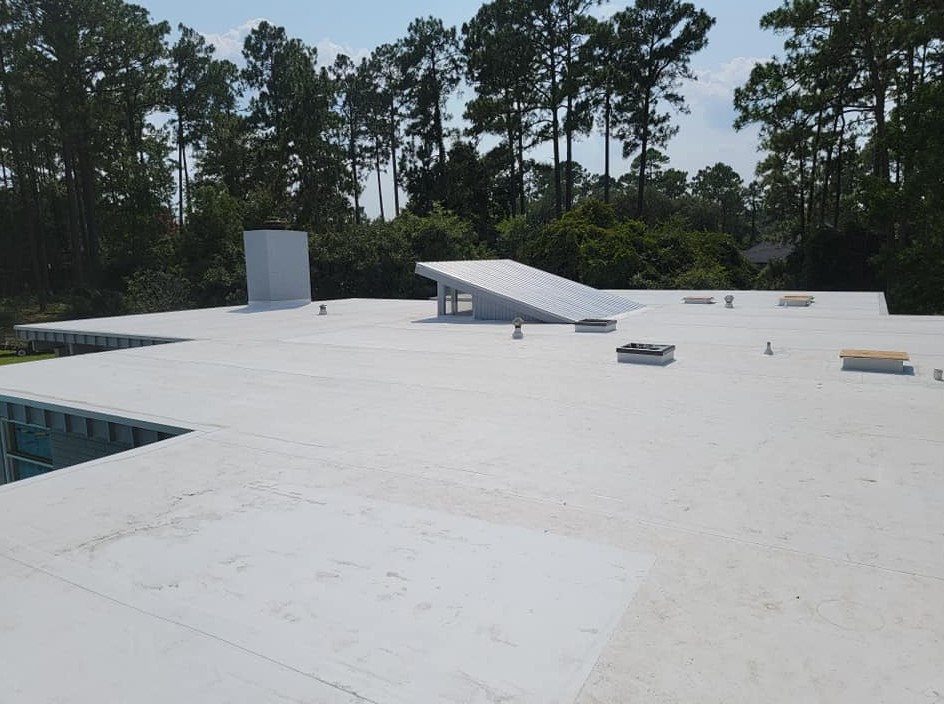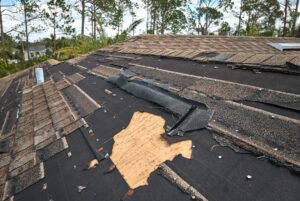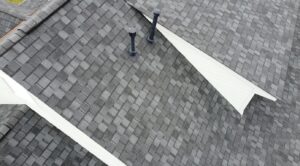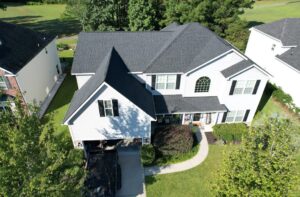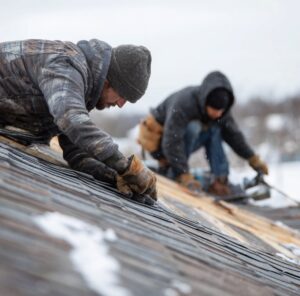Selecting the right roofing system is one of the most important decisions property owners and facility managers will make for a commercial building. Your roof isn’t just a cover—it’s your building’s first line of defense against water, wind, sun, and temperature fluctuations. With so many materials and systems available, choosing the right commercial roof can feel overwhelming.
The key is understanding the unique needs of your building, your long-term goals, and the options that best meet those requirements. At Designer Roofing & Restoration, we help businesses throughout Savannah and the surrounding areas find durable, cost-effective commercial roofing solutions.
This guide breaks down the most common roofing types, factors to consider, and how to make the right choice for your property.
Why Choosing the Right Commercial Roof Matters
A commercial roof is a long-term investment. Installing the right system can:
- Lower maintenance and repair costs
- Improve energy efficiency
- Extend the building’s lifespan
- Enhance curb appeal and tenant satisfaction
- Ensure compliance with local codes and safety regulations
Conversely, the wrong roof can lead to water damage, energy waste, and frequent disruptions. That’s why choosing the right commercial roof is a decision worth researching thoroughly.
Factors to Consider Before Selecting a Commercial Roofing System
Before looking at roofing materials, assess the specific requirements of your property. Here are key factors to evaluate:
1. Building Structure and Roof Design
Start by understanding the shape and slope of your roof. Most commercial buildings have flat or low-slope roofs, which require specific systems designed to prevent ponding water and manage drainage.
Your roof’s weight capacity is also critical. Heavier materials like built-up roofing (BUR) or ballasted systems may not be suitable for every structure without additional support.
2. Climate and Weather Conditions
Savannah’s hot, humid summers and occasional coastal storms mean roofing systems must offer UV protection, wind resistance, and effective waterproofing.
Ask your contractor:
- How well does this system handle high humidity?
- Is it rated for wind uplift?
- Will it resist mold and algae growth?
For more information about climate-specific building design, the U.S. Department of Energy offers insights here.
3. Budget and Lifecycle Costs
Don’t just consider upfront costs. Weigh installation expenses, maintenance needs, energy efficiency, and expected lifespan. A system with a higher installation cost might provide better value over time if it lasts longer or reduces repair frequency.
Common Commercial Roofing Options and Their Benefits
Here’s a breakdown of the most widely used commercial roofing materials, along with their pros and cons.
1. TPO (Thermoplastic Polyolefin) Roofing
Best for: Energy efficiency, UV resistance, cost-effectiveness
Lifespan: 15–25 years
Key Benefits:
- Reflective white surface reduces cooling costs
- Welded seams provide superior leak protection
- Lightweight and easy to install
Considerations:
- Can be punctured by heavy foot traffic or debris
- Installation quality is crucial for performance
TPO is a popular choice for businesses in warmer climates like Savannah due to its cool roofing properties.

2. EPDM (Ethylene Propylene Diene Monomer) Roofing
Best for: Affordability, flexibility, resistance to weathering
Lifespan: 20–30 years
Key Benefits:
- Performs well in extreme temperatures
- Easy to repair and maintain
- Resists UV damage and ozone exposure
Considerations:
- Typically black in color, which can absorb heat
- May require additional insulation to improve energy performance
EPDM is a trusted material for large, flat commercial roofs due to its long-term durability.
3. Modified Bitumen Roofing
Best for: Small to medium-sized commercial buildings, roofs with heavy foot traffic
Lifespan: 20–30 years
Key Benefits:
- Multiple layers enhance durability
- Can be installed with torch-down, cold adhesive, or self-adhered sheets
- Good resistance to tears and punctures
Considerations:
- Requires experienced installation for best results
- Can be more expensive than single-ply options
Modified bitumen is ideal for buildings that need rugged performance and frequent rooftop access.
4. Built-Up Roofing (BUR)
Best for: Longevity, multi-layer protection, historic or older buildings
Lifespan: 30+ years
Key Benefits:
- Time-tested reliability
- Multiple layers of bitumen and fabric provide excellent waterproofing
- Heavy surface resists damage and foot traffic
Considerations:
- Heavier than most roofing systems
- Longer installation process and higher labor costs
BUR remains a durable, proven solution for commercial buildings seeking long-lasting protection.
5. Metal Roofing
Best for: Sloped commercial roofs, modern designs, long-term investment
Lifespan: 40–70 years
Key Benefits:
- Extremely durable and low-maintenance
- Fire-resistant and energy-efficient
- Available in various styles and colors
Considerations:
- Higher upfront cost
- Not suitable for flat roofs without additional engineering
Metal roofing is a premium option that combines aesthetics with performance, often used for schools, churches, and commercial campuses.
Additional Features to Consider for Your Commercial Roof
No matter which material you choose, the following add-ons can increase your roof’s performance:
- Cool roof coatings to reflect sunlight and reduce heat absorption
- Insulation upgrades for better energy efficiency
- Roof access systems such as walkways and railings
- Drainage solutions like tapered insulation or interior drains
Your contractor should design a complete system that includes all necessary accessories to ensure proper function and longevity.
Understand Warranties and Maintenance Requirements
One of the most overlooked parts of choosing the right commercial roof is understanding the warranty. Most commercial systems come with two types:
- Manufacturer warranties covering material defects
- Workmanship warranties provided by the contractor
Ask these key questions:
- How long is the warranty?
- What actions could void it?
- Are inspections required to maintain coverage?
Also consider establishing a preventive maintenance plan to extend your roof’s lifespan and keep your warranty valid. Learn more about the benefits of preventive roof maintenance from the National Roofing Contractors Association.
Choose a Contractor That Specializes in Commercial Roofing
Installing a commercial roof is a highly specialized process. You’ll want to work with a contractor who:
- Is licensed and insured
- Has experience with multiple commercial roofing systems
- Can provide references from previous commercial clients
- Offers detailed proposals and transparent pricing
At Designer Roofing & Restoration, our team brings years of commercial roofing experience and a commitment to high-quality craftsmanship. We work with business owners, property managers, and general contractors to ensure every roof is built to last.
Let’s Build the Right Roof for Your Business
Every building is different, and so is every roofing system. The right choice depends on your structure, your goals, and your budget. Whether you need a long-lasting roof with minimal maintenance or a system designed to improve energy efficiency, we’re here to help.
At Designer Roofing & Restoration, we provide expert guidance to help you make the best decision. Our process includes:
- A detailed roof assessment
- Honest recommendations tailored to your building
- High-quality materials from trusted manufacturers
- Professional installation backed by strong warranties
Get a free inspection now and find out which commercial roofing system is right for your building. We’re here to help protect your property, your operations, and your bottom line—for years to come.

